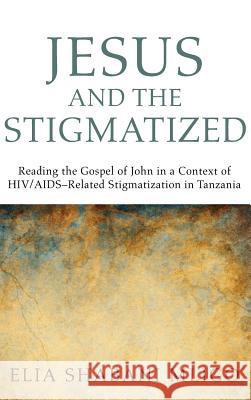Jesus and the Stigmatized » książka
Jesus and the Stigmatized
ISBN-13: 9781498257435 / Angielski / Twarda / 2011 / 474 str.
Jesus and the Stigmatized
ISBN-13: 9781498257435 / Angielski / Twarda / 2011 / 474 str.
(netto: 346,75 VAT: 5%)
Najniższa cena z 30 dni: 364,09
ok. 16-18 dni roboczych.
Darmowa dostawa!
Description: Biblical scholars often read the Bible with their own interpretive interests in mind, without associating the Bible with the concerns of laypeople. This largely undermines the contributions laypeople can offer from reading the Bible in their own contexts and from their own life experiences. Moreover, such exclusively scholarly reading conceals the role of biblical texts in dealing with current social problems, such as HIV/AIDS-related stigmatization. Hence, the lack of lay participation in the process of Bible reading makes the Bible less visible in various common life situations. In this volume Elia Shabani Mligo draws on his fieldwork among people living with HIV/AIDS (PLWHA) in Tanzania, selects stigmatization as his perspective, and chooses participant-centered contextual Bible study as his method to argue that the reading of texts from the Gospel of John by PLWHA (given their lived experiences of stigmatization) empowers them to reject stigmatization as unjust. Mligo's study shows that Christian PLWHA reject stigmatization because it does not comply with the attitude of Jesus toward stigmatized groups in his own time. The theology emerging from the readings by stigmatized PLWHA, through their evaluation of Jesus' attitudes and acts toward stigmatized people in the texts, challenges churches in their obligatory mission as disciples of Jesus. Churches are challenged to reconsider healing, hospitality and caring, prophetic voices against stigmatization, and the way they teach about HIV and AIDS in relation to sexuality. Churches must revisit their practices toward stigmatized groups and listen to their voices. Mligo argues that participant-centered Bible-study methods similar to the one used in this book (whereby stigmatized people are the primary interlocutors in the process) can be useful tools in listening to the voices of stigmatized groups. Endorsements: ""Elia Shabani Mligo's own profound knowledge about the situation of people living with HIV/AIDS in Tanzania is balanced with a comprehensive and informed reflection on the complex phenomenon of stigmatization. He convincingly shows how reading the Bible can be a resource toward dignity for marginalized people. The book is highly valuable both in regard to the concrete topic discussed--HIV/AIDS and stigmatization--and for those who want to do Bible studies in a broader context than the academia."" --Helge S. Kvanvig University of Oslo ""One of Elia Shabani Mligo's most important contributions to the discussion of overcoming the scandal of stigmatization to PLWHA is his insistence that it is achievable. Here he makes his powerful, prophetic, and deep case for laypeople in faith communities and their leaders to be engaged in ending the stigmatization in our society. This is a gem of a book that I am delighted to endorse because it tells the truth in ways that empower."" --Lechion Peter Kimilike Njombe University College Project About the Contributor(s): Elia Shabani Mligo is Principal of Kidugala Theological College, in Njombe, Tanzania. He is currently an employee of the Evangelical Lutheran Church in Tanzania in the Southern Diocese.
Description:Biblical scholars often read the Bible with their own interpretive interests in mind, without associating the Bible with the concerns of laypeople. This largely undermines the contributions laypeople can offer from reading the Bible in their own contexts and from their own life experiences. Moreover, such exclusively scholarly reading conceals the role of biblical texts in dealing with current social problems, such as HIV/AIDS-related stigmatization. Hence, the lack of lay participation in the process of Bible reading makes the Bible less visible in various common life situations.In this volume Elia Shabani Mligo draws on his fieldwork among people living with HIV/AIDS (PLWHA) in Tanzania, selects stigmatization as his perspective, and chooses participant-centered contextual Bible study as his method to argue that the reading of texts from the Gospel of John by PLWHA (given their lived experiences of stigmatization) empowers them to reject stigmatization as unjust. Mligos study shows that Christian PLWHA reject stigmatization because it does not comply with the attitude of Jesus toward stigmatized groups in his own time. The theology emerging from the readings by stigmatized PLWHA, through their evaluation of Jesus attitudes and acts toward stigmatized people in the texts, challenges churches in their obligatory mission as disciples of Jesus. Churches are challenged to reconsider healing, hospitality and caring, prophetic voices against stigmatization, and the way they teach about HIV and AIDS in relation to sexuality.Churches must revisit their practices toward stigmatized groups and listen to their voices. Mligo argues that participant-centered Bible-study methods similar to the one used in this book (whereby stigmatized people are the primary interlocutors in the process) can be useful tools in listening to the voices of stigmatized groups. Endorsements:""Elia Shabani Mligos own profound knowledge about the situation of people living with HIV/AIDS in Tanzania is balanced with a comprehensive and informed reflection on the complex phenomenon of stigmatization. He convincingly shows how reading the Bible can be a resource toward dignity for marginalized people. The book is highly valuable both in regard to the concrete topic discussed--HIV/AIDS and stigmatization--and for those who want to do Bible studies in a broader context than the academia.""--Helge S. KvanvigUniversity of Oslo""One of Elia Shabani Mligos most important contributions to the discussion of overcoming the scandal of stigmatization to PLWHA is his insistence that it is achievable. Here he makes his powerful, prophetic, and deep case for laypeople in faith communities and their leaders to be engaged in ending the stigmatization in our society. This is a gem of a book that I am delighted to endorse because it tells the truth in ways that empower.""--Lechion Peter KimilikeNjombe University College ProjectAbout the Contributor(s):Elia Shabani Mligo is Principal of Kidugala Theological College, in Njombe, Tanzania. He is currently an employee of the Evangelical Lutheran Church in Tanzania in the Southern Diocese.











